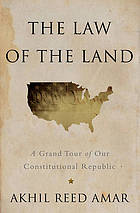
The Law of the Land
A Grand Tour of Our Constitutional Republic
کتاب های مرتبط
- اطلاعات
- نقد و بررسی
- دیدگاه کاربران
نقد و بررسی

February 16, 2015
Geography takes center stage in this deep dive into U.S. constitutional jurisprudence. The third installment of a continuing series from Yale law professor Amar, following America’s Constitution and America’s Unwritten Constitution, this ambitious treatise shows how landmarks in American constitutional history can be viewed as products of topography. Amar detects a “Midwestern twang” in Illinois-native Abraham Lincoln’s particular version of unionism. He also traces Supreme Court justice Hugo Black’s textualist reading of the Constitution to his Deep South roots. Amar suggests an unlikely but profound connection between our modern understanding of federalism and Camden, N.J. Though at times the book feels like the literary equivalent of eating one’s vegetables (“By the end of this chapter, you will know all that you need
to know about these arcane 18th-century legal instruments”), the payoff for tackling the denser passages is a deeper understanding of topics rarely discussed in the detail they deserve. For example, Amar’s careful parsing of the Second Amendment will leave readers forever skeptical of super
ficial sound bites on the issue. He amply proves that the varied American landscape provides an illuminating lens with which to view our legal system’s fundamental tenets. Agent: Glen Hartley, Writers Reps.

February 1, 2015
In the third volume of a series that assesses the Constitution from varying perspectives, a law professor approaches the document geographically, examining it through the prism of the states.Constitutional law, as Amar (Law and Political Science/Yale Univ.; America's Unwritten Constitution: The Precedents and Principles We Live By, 2012, etc.) reminds us, is not merely the province of scholars and judges, but rather "a game that many can play...if they are smart and serious." The geographical angle is itself a kind of game that, while not wholly successful, has the virtue of reminding us how much of our constitutional law is shaped by our federalism. Using 12 states from all regions of the country, Amar tells individual constitutional stories; all hold national implications, but each one is distinctively imprinted by the characteristics of a place or region. He deals first with personalities, influential constitutional decision-makers whose roots powerfully affected their thoughts on the nature of the Union (Illinois' Lincoln), the applicability of the Bill of Rights to the states (Alabama's Hugo Black) and the limits of presidential power (New York's Robert Jackson). The author then turns to signal cases-e.g., Brown v. Board of Education, Tinker v. Des Moines and Bush v. Gore-where the histories of the states from which each arose have inflected our understanding of civil rights, free speech and presidential selection. Finally, Amar concludes with a discussion of some constitutional principles and provisions: presidential succession (Ohio and Texas), gun rights (Wyoming), search and seizure (Massachusetts), and federalism (New Jersey). Even those disinclined to accept his thesis of geographic determinism will delight in his smooth prose, his frank confessions of bias, his frequently sharp insights and the many sparkling nuggets he scatters throughout, whether about the location of the only national park site named after a Supreme Court case or how Camden, New Jersey, got its name. A provocative, consistently interesting take on our constitutional history.
COPYRIGHT(2015) Kirkus Reviews, ALL RIGHTS RESERVED.

February 15, 2015
Amar (Sterling Professor of Law and Political Science, Yale Univ.; America's Constitution: A Biography) examines American constitutional issues by placing them in a geographic perspective. He argues that the diverse geography and culture of the United States has had a significant impact on its Constitution. The first chapter, for example, roots Abraham Lincoln's opposition to secession in his experience on the Illinois frontier. Amar argues that Lincoln's migration to Illinois gave him a deep loyalty to the Union rather than to any region or state. Each succeeding chapter looks at a constitutional question by examining a court case or point of law and the geography that surrounded it, from freedom of speech in Tinker v. Des Moines (1969) to voting rights in Bush v. Gore. The author combines a thorough knowledge of the subject and an interesting premise with straightforward, sometimes humorous prose to create a book that entertains and educates. VERDICT This book is intended for students of law and political science and general readers who have a serious interest in the subject. Recommended for academic and law libraries and large public libraries. [See "Editors' Spring Picks," p. 33.]--Becky Kennedy, Atlanta-Fulton P.L.
Copyright 2015 Library Journal, LLC Used with permission.

























دیدگاه کاربران